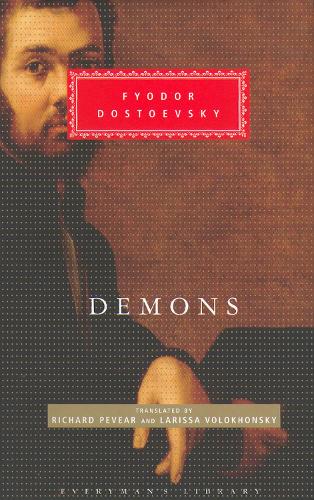
Demons
(Hardback)
Available Formats
Publishing Details
Demons
By (Author) Fyodor Dostoevsky
Translated by Richard Pevear
Translated by Larissa Volokhonsky
Introduction by Joseph Frank
Everyman
Everyman's Library
15th October 2000
25th August 2000
United Kingdom
Classifications
Physical Properties
Hardback
784
Width 132mm, Height 212mm, Spine 40mm
795g
Description
Set in mid 19th-century Russia, Demons examines the effect of a charismatic but unscrupulous self-styled revolutionary leader on a group of credulous followers.Inspired by the true story of a political murder that horrified Russians in 1869, Fyodor Dostoevsky conceived of Demons as a "novel-pamphlet" in which he would say everything about the plague of materialist ideology that he saw infecting his native land. What emerged was a prophetic and ferociously funny masterpiece of ideology and murder in pre-revolutionary Russia-a novel that is rivaled only by The Brothers Karamazov as Dostoevsky's greatest. The award-winning translators Richard Pevear and Larissa Volokhonsky continue their acclaimed series of Dostoevsky translations with this novel, also known as The Possessed.
Reviews
"ÝAn admirable new translation of...Dostoevsky's masterpiece." -"New York Review of Books" "The merit in this edition of "Demons" resides in the technical virtuosity of the translators...They capture the feverishly intense, personal explosions of activity and emotion that manifest themselves in Russian life." -"New York Times Book Review"""Demons" is the Dostoevsky novel for our age...ÝPevear and Volokhonsky have managed to capture and differentiate the characters' many voices...They come into their own when faced with Dostoevsky's wonderfully quirky use of varied speech patterns...A capital job of restoration." -"Los Angeles Times" With an Introduction by Richard Pevear
Author Bio
Fyodor Dostoevsky was born in Moscow on 11th November 1821. He had six siblings and his mother died in 1837 and his father in 1839. He graduated from the St Petersburg Academy of Military Engineering in 1846 but decided to change careers and become a writer. His first book, Poor Folk, did very well but on 23rd April 1849 he was arrested for subversion and sentenced to death. After a mock-execution his sentence was commuted to hard labour in Siberia where he developed epilepsy.He was released in 1854. His 1860 book, The House of the Dead was based on these experiences. In 1857 he married Maria Dmitrievna Isaeva. After his release he adopted more conservative and traditional values and rejected his previous socialist position. In the following years he spent a lot of time abroad, struggled with an addiction to gambling and fell deeply in debt. His wife died in 1864 and he married Anna Grigoryeva Snitkina. In the following years he published his most enduring and successful books, includingCrime and Punishment (1865). He died on 9th February 1881.
